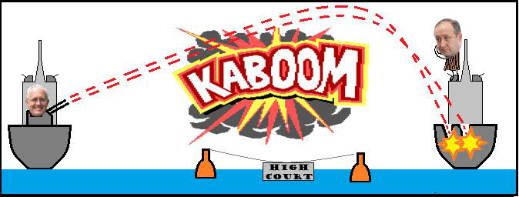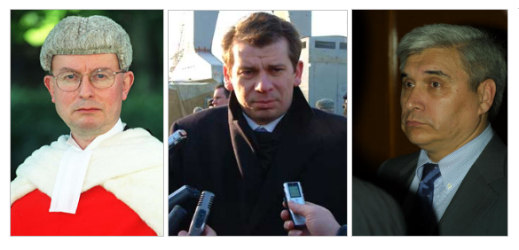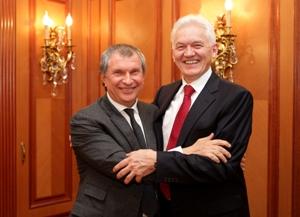
By John Helmer, Moscow
A decade of lawsuits promoted in the UK courts by Sovcomflot’s chief executive, Sergei Frank (right), has ended disastrously with a judgement issued against him and his company in the High Court today.
Justice Andrew Smith has ruled in favour of Yury Nikitin (left), Sovcomflot’s chartering partner before Frank took over the state-owned shipping concern in 2004. The judgement singles out Frank, and Sovcomflot’s lawyer, Vladimir Mednikov; and charges them with dishonesty, fabrication of evidence, illegal information gathering, lying to the court, and with having been “seriously and culpably in breach of their duties.” text. Click to read the full text.
The judgement orders Sovcomflot back into court for an assessment of the damages that must now be paid to Nikitin. A court hearing will follow to consider expert evidence on the amount. Based on Smith’s ruling today, sources close to the case expect this will be “in excess of $180 million”.
The sum is so large that, if confirmed, it may wipe out Sovcomflot’s profit for this year and next. According to Sovcomflot’s latest financial report, the company ran a loss of $39.2 million in 2013. In the six months to June 30, 2014, the bottom line showed a profit of $63.6 million.
Until now Sovcomflot has told its auditors, Ernst & Young, to set aside no provision for any court order in Nikitin’s favour. “Management is of the opinion”, the company declared August 28, “that the claimed amount is speculative and the likelihood of this claim being successful is remote”.
According to Justice Smith (below left), who has been presiding in the complex litigation since 2009, Frank gave “dishonest evidence”, and was responsible for the improper penalties which have been imposed on Nikitin until now.  Smith has also exonerated Frank’s predecessors at the state shipping group, Dmitry Skarga (centre) and Tagir Izmailov (right). They, along with Nikitin, have been shielded by the UK Government from prosecution in Russia on claims the UK courts have dismissed.
Smith has also exonerated Frank’s predecessors at the state shipping group, Dmitry Skarga (centre) and Tagir Izmailov (right). They, along with Nikitin, have been shielded by the UK Government from prosecution in Russia on claims the UK courts have dismissed.
 Although their names are not mentioned, Smith’s 25-page judgement is an implied rebuke to the two men identified in the original High Court witness testimony as having fabricated the case in the first place for their own commercial advantage, and given Frank the backing of Russian police and prosecutors in their fabrications. They are Igor Sechin (left) and Gennady Timchenko (right).
Although their names are not mentioned, Smith’s 25-page judgement is an implied rebuke to the two men identified in the original High Court witness testimony as having fabricated the case in the first place for their own commercial advantage, and given Frank the backing of Russian police and prosecutors in their fabrications. They are Igor Sechin (left) and Gennady Timchenko (right).
Both are now on the current international sanctions lists of the US government and the European Union. For the court evidence of their role, with Frank, in the Sovcomflot affair, read this.
 Frank has not joined Sechin and Timchenko on the sanctions list. But his family has been hit. Gleb Frank (right), Sergei’s son, is the husband of Timchenko’s daughter; Ksenia, she is an executive at the Timchenko-owned company, Transoil, which carries crude oil to port, and a board member of a Timchenko family foundation. Transoil was sanctioned by the US on April 28. Gleb Frank is Timchenko’s stand-in as control shareholder at Russian Sea Group (RSG), a leading fishing fleet operator and fish importer. Timchenko bought into RSG in July 2011 through his investment holding, Volga Resources. Volga is also on the US sanctions list. How Frank Junior came to fish in these troubled waters was reported here. Frank also represents Timchenko’s shareholding on the boards of Stroitransgaz, a builder of oil and gas pipelines, and Akvanika, a bottled water vendor; both companies have also been sanctioned by the US.
Frank has not joined Sechin and Timchenko on the sanctions list. But his family has been hit. Gleb Frank (right), Sergei’s son, is the husband of Timchenko’s daughter; Ksenia, she is an executive at the Timchenko-owned company, Transoil, which carries crude oil to port, and a board member of a Timchenko family foundation. Transoil was sanctioned by the US on April 28. Gleb Frank is Timchenko’s stand-in as control shareholder at Russian Sea Group (RSG), a leading fishing fleet operator and fish importer. Timchenko bought into RSG in July 2011 through his investment holding, Volga Resources. Volga is also on the US sanctions list. How Frank Junior came to fish in these troubled waters was reported here. Frank also represents Timchenko’s shareholding on the boards of Stroitransgaz, a builder of oil and gas pipelines, and Akvanika, a bottled water vendor; both companies have also been sanctioned by the US.
The first London court judgement by Justice Smith against Sergei Frank was reported in December 2010; the second in March 2011. Both have been upheld by the Court of Appeal, and the Supreme Court. According to the Court of Appeal, Frank’s litigation was “vindictive”. All subsequent efforts by Frank, Sechin, Timchenko, and government officials Igor Shuvalov and Sergei Naryshkin, to privatize the shipping company and sell shares on an international stock exchange have collapsed.
In today’s ruling, Smith acknowledged that he had already found against Nikitin on some of Sovcomflot’s allegations of bribery in obtaining charter and ship construction contracts. But he ruled that those findings were dwarfed by Frank’s misconduct and that of his London lawyers. “In my assessment the impropriety of the claimants [Sovcomflot] who obtained the 2005 orders and the 2007 orders was such that it would be wrong not to enforce the undertaking [for payment of damages to Nikitin] even if I take account of all the misconduct of which the claimants complain.”
Sovcomflot had applied for the High Court orders at the start of the litigation in order to freeze bank accounts and assets of Nikitin and his shipping companies. According to Smith, the value frozen over almost a decade came to $486.5 million. According to Nikitin, the orders were improperly issued because Sovcomflot and its lawyers “were guilty of misrepresentation and non-disclosure when they obtained them.”
At the time the freeze commenced, the High Court warned Sovcomflot that “if the court later finds that this order has caused loss to the respondent [Nikitin] and decides that the respondent should be compensated for that loss, the applicants [Sovcomflot] will comply with any order the court may make.” An independent calculation cited by the judge indicates that one part of the damages, the smaller part dating from 2005, comes to at least $69 million. The judge has also called for the damages to be estimated for the 2007 order. Nikitin’s claim is for $184 million. This is now likely to be revised above $200 million.
The damages are high because of the length of time Sovcomflot kept the assets out of Nikitin’s control through the course of the litigation, and because of what the judge labelled “culpable” manipulation of the evidence in the case. “The claimants [Sovcomflot] were in breach of their duty to make proper disclosure and not to avoid misrepresentation. In my judgment they were in material and culpable breach both in 2005 and in 2007. The claimants did not disclose when they obtained the 2005 orders: i) That, as the board minutes recorded, many of the transactions of which they complained, had been considered by and were carried out with the approval of the Executive Board of Sovcomflot. ii) That Sovcomflot had had the wrongdoing of which they complained by investigators who had, to their knowledge, used unlawful methods to obtain information”.
Sovcomflot, Smith ruled, deliberately concealed the company’s records from the court “as is evidenced by the extent of their efforts to present at trial untruthful evidence to explain away the [board] minutes”.
There has been no comment yet from Sovcomflot’s spokesmen in London and Moscow on the condemnation or the liability. Nikitin and his lawyers are also making no comment. Sovcomflot’s lawyers have conceded in court that they will not appeal Smith’s latest judgement. They will try instead to persuade the court to cut the award below $200 million.











Leave a Reply